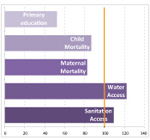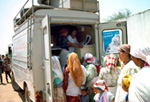UN DESA | DPAD | Development Policy Analysis Division
Capacity Development and Advisory Services
Millennium Development Goals
Morocco highlights
Robust economic growth would not guarantee achievement of all the development goals
| MDG progress achieved by 2015 under a business-as-usual scenario |
 |
Recent positive economic developments have provided solid ground for advancement towards the MDGs in Morocco. Many of the targets would be fully or nearly achieved if current economic trends were to continue until 2015. Latest efforts of the Government to promote infrastructure development would result in nearly universal access to drinkable water and sanitation facilities by 2015. Growing per capita consumption and health spending would permit to achieve more than 80% of the mortality-related targets by 2015. However, in spite of anticipated increases in primary education enrolment, which would reach 100% by 2015, achieving targets for primary school completion would remain unlikely.
Additional spending is required to speed progress towards the MDGs, especially in education
| Additional public spending by sector under a tax financing MDG scenario, 2007-2015 |
 |
Meeting MDG targets without allocating new resources appears to be unrealistic for Morocco. The additional funding required represents around 2% of GDP on average per year between 2005 and 2015. Most of these resources would be concentrated in primary education because of the specifics of the educational sector in Morocco, where elevated repetition and drop-out rates ranging between 9% and 31% continue to negatively affect timely completion of primary education.
Major healthcare system reforms are needed
 |
Morocco faces serious problems in the health sector, where child and maternal death rates remain alarmingly high compared to those of countries with similar levels of economic development. According to the Ministry for Health, the present health system suffers from serious dysfunctions that lead to limited access to healthcare facilities by the poor and those who live in rural areas; regional disparities in the distribution of healthcare services; and an inadequate response in the treatment of certain chronic diseases. In addition, management of public hospitals remains centralized, causing great inefficiency. The lack of adequately trained healthcare personnel undermines the possibility of satisfying the growing demand for healthcare services.
Related documents
- Country study "Assessing Development Strategies to Achieve the MDGs in the Republic of Egypt" (2011).
- Country study "Assessing Development Strategies to Achieve the MDGs in the Republic of Tunisia" (2011).
- Country study "Assessing Development Strategies to Achieve the MDGs in the Republic of Yemen" (2011).